
Korean Economic Review
Scope & Guideline
Elevating the conversation in economics and finance.
Introduction
Aims and Scopes
- Applied Economic Research:
Focuses on empirical studies that utilize quantitative methods to analyze economic phenomena, particularly within the South Korean context. - Interdisciplinary Approaches:
Encourages research that intersects with other fields such as law, public policy, and sociology, reflecting the multifaceted nature of economic issues. - Policy Analysis:
Examines the implications of economic policies, including taxation, labor laws, and market regulations, thereby providing recommendations for policymakers. - Behavioral Economics:
Incorporates psychological insights into economic decision-making, exploring how individual behaviors affect market outcomes and economic structures. - Regional Economic Studies:
Explores economic issues specific to Korea and East Asia, including labor markets, industrial organization, and regional development.
Trending and Emerging
- Impact of Technology on Economics:
Research exploring the economic implications of technological advancements, particularly AI and automation, has surged, highlighting issues such as labor displacement and new regulatory frameworks. - Behavioral Insights in Economics:
There is a growing trend towards incorporating behavioral economic theories to better understand consumer behavior, decision-making processes, and market dynamics. - Environmental Economics and Sustainability:
An increasing number of studies focus on environmental issues, including the economic impacts of pollution, climate change, and sustainable development policies. - Public Health Economics:
The COVID-19 pandemic has catalyzed research on public health economics, emphasizing the relationship between health policies and economic outcomes, particularly in labor supply and consumer behavior. - E-Commerce and Digital Markets:
As the digital economy expands, studies examining the effects of e-commerce on traditional markets, wage structures, and consumer behavior are becoming more prevalent.
Declining or Waning
- Traditional Labor Economics:
Research focusing on conventional labor economics, such as wage differentials and employment rates, has diminished as newer themes, like the impact of automation and technology on labor markets, gain traction. - Static Economic Models:
The prevalence of static models in economic analysis appears to be declining, with a shift towards dynamic models that better capture the complexities of economic behaviors over time. - Macroeconomic Stability Studies:
Although still relevant, the focus on traditional macroeconomic stability has waned in favor of more nuanced analyses that consider factors such as behavioral economics and policy impacts. - International Trade Theories:
Research on classical international trade theories has seen a decrease, likely due to the growing interest in the effects of globalization and trade policies in a digital economy. - Financial Market Efficiency:
Studies that assume market efficiency without considering behavioral factors are becoming less common, as more researchers recognize the importance of psychological and social influences on financial markets.
Similar Journals
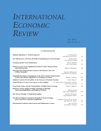
INTERNATIONAL ECONOMIC REVIEW
Fostering scholarly dialogue in economics and econometrics.INTERNATIONAL ECONOMIC REVIEW is a prestigious journal dedicated to advancing knowledge in the fields of economics and econometrics. Published by Wiley in the United Kingdom, this journal boasts an impressive Q1 ranking in the 2023 category of Economics and Econometrics, reflecting its significant impact in the academic community. With a continued publication since its inception in 1979, it offers a platform for rigorous scholarly articles that address contemporary issues, theoretical developments, and empirical findings in economics. Although it does not currently offer open access options, the journal maintains broad accessibility through institutional subscriptions. Researchers, professionals, and students are encouraged to contribute to and engage with this leading publication to foster knowledge exchange and stimulate scholarly dialogue in economic research. With its commitment to high-quality scholarship, the INTERNATIONAL ECONOMIC REVIEW remains a vital resource for developing insights that inform both policy and practice.

ECONOMIST-NETHERLANDS
Illuminating Historical and Contemporary Economic ChallengesThe Economist-Netherlands, published by Springer, is a prestigious journal that has been a cornerstone in the field of economics since its inception in 1852. With a strong focus on disseminating high-quality research and insights, this journal serves as an essential resource for economists, researchers, and practitioners interested in the dynamic landscape of economic theory and applications. Currently ranked in the Q3 category in Economics and Econometrics, this journal demonstrates a commitment to scholarly rigor, as reflected in its Scopus ranking within the 55th percentile. The journal features an extensive scope that encompasses key topics relevant to both historical and contemporary economic challenges, fostering a vibrant academic discourse. While access is not open, the journal remains a vital publication for anyone seeking to advance their knowledge in the economic sector. With an enduring legacy, the Economist-Netherlands continues to contribute significantly to the evolution of economic scholarship.
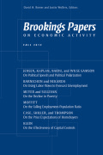
BROOKINGS PAPERS ON ECONOMIC ACTIVITY
Innovating Economic Research for a Better Tomorrow.BROOKINGS PAPERS ON ECONOMIC ACTIVITY, published by Johns Hopkins University Press, stands at the forefront of economic research, providing critical insights and analysis across the fields of economics and econometrics. With a prestigious Q1 ranking in both the Business, Management and Accounting (miscellaneous) and Economics and Econometrics categories for 2023, this journal is renowned for its scholarly contributions that shape public policy and debates within the economic community. Since its inception, the journal has consistently published high-impact research and innovative discussions surrounding economic activity, making it an essential resource for researchers, professionals, and students alike. Although it does not offer open access, its academic rigor and relevance continue to attract a broad readership, contributing to a deeper understanding of economic phenomena in the United States and beyond. For more information, visit the journal’s homepage or the Johns Hopkins University Press website.
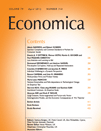
ECONOMICA
Pioneering Insights in Economics and EconometricsEconomica is a prestigious academic journal published by Wiley, with a rich history dating back to 1937. Based in the United Kingdom, this journal has established itself as a key resource in the field of Economics and Econometrics, classified in the top quartile (Q1) of its category for 2023. With an ISSN of 0013-0427 and an E-ISSN of 1468-0335, Economica covers a wide array of topics that contribute to the understanding of economic theory and practice, making it essential reading for researchers, professionals, and students alike. Despite being a subscription-based journal, its rigorous editorial process ensures that only the highest quality research is published, further bolstering its impact and influence in the academic community. The journal plays a vital role in advancing economic scholarship by featuring original research articles, critical reviews, and innovative methodologies, promoting discourse among scholars and practitioners.

B E Journal of Economic Analysis & Policy
Empowering Policy Through Rigorous Economic AnalysisB E Journal of Economic Analysis & Policy, published by Walter de Gruyter GmbH in Germany, stands as a pivotal resource in the field of economics and econometrics since its establishment in 2001. Boasting an ISSN of 2194-6108 and an E-ISSN of 1935-1682, this journal is committed to advancing the understanding of economic policies and their analysis through rigorous, peer-reviewed research. With an impressive categorization that includes a Q2 ranking in the Economics, Econometrics and Finance (miscellaneous) category and a Q3 ranking in other economics niches as of 2023, it emphasizes the importance of empirical research and robust theoretical frameworks. The journal is indexed in Scopus, reaffirming its credibility, with ranks in the 49th and 32nd percentiles for its respective categories. Researchers, professionals, and students alike will find valuable insights and innovative perspectives within its pages, as it continues to shape discussions around economic policy in an ever-evolving global landscape.

Seoul Journal of Economics
Driving Innovation in Econometrics and FinanceThe Seoul Journal of Economics, published by the Seoul National University Institute of Economic Research, stands as a significant peer-reviewed platform for advancing scholarship in the fields of economics, econometrics, and finance. As evidenced by its Q2 ranking in the Economics category for 2023, this journal plays a crucial role in disseminating high-quality research and fostering intellectual dialogue amongst scholars and practitioners. With a commitment to bridging theoretical frameworks and empirical findings, the journal covers a diverse array of topics central to modern economic inquiry. While the journal is not open access, it provides vital insights into the rapidly evolving economic landscape in South Korea and beyond, making it a valuable resource for researchers, professionals, and students who seek to enhance their understanding of contemporary economic challenges and methodologies. With its focus on collaboration and rigorous academic discourse, the Seoul Journal of Economics contributes significantly to the global economic knowledge base, encouraging impactful research that influences policy and practice.
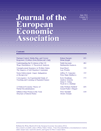
Journal of the European Economic Association
Shaping the Future of Economic Understanding and ApplicationThe Journal of the European Economic Association, published by Oxford University Press, stands as a cornerstone in the field of economics, boasting a strong impact factor that reflects its high citation rates and significance among peers. With an impressive Scopus ranking of 12 out of 288 in general economics, encompassing a remarkable 96th percentile, this journal is recognized for its rigorous peer-reviewed research contributions that advance the understanding of economic theory and policy. Dedicated to publishing innovative studies and theoretical advancements since its inception in 2003, it continues to engage scholars worldwide, providing vital insights applicable to both academia and industry. Although it does not follow an open-access model, the journal's extensive reach and commitment to excellence make it an essential resource for researchers, professionals, and students seeking to deepen their understanding of contemporary economic issues. Based in the United States, the journal reflects a European perspective on global economic challenges, making it indispensable for those at the forefront of economic research.
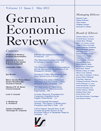
German Economic Review
Illuminating the Landscape of Economics and EconometricsGerman Economic Review is a distinguished academic journal published by WALTER DE GRUYTER GMBH, focusing on diverse aspects of economics and econometrics. With its ISSN 1465-6485 and E-ISSN 1468-0475, the journal serves as a vital platform for disseminating high-quality research from both established scholars and emerging voices in the economic field. Housed in the UK, the journal contributes significantly to the academic community, evidenced by its placement in the Q3 category for Economics and Econometrics in 2023 and its Scopus ranking of #381 out of 716, reflecting its impactful presence in the discipline. German Economic Review does not offer open access options; however, its convergence from 2001 to 2024 indicates a long-standing commitment to advancing economic discourse. This journal is ideal for researchers, professionals, and students eager to engage with contemporary economic theories and applications.

CHINA ECONOMIC REVIEW
Connecting Scholars to China’s Economic RealitiesChina Economic Review, published by Elsevier Science Inc, stands as a leading academic journal dedicated to the rigorous exploration of economic and financial issues pertinent to China and its place in the global economy. Established in 1989, this journal has built a robust reputation over the years, achieving a prestigious Q1 ranking in both Economics and Econometrics and Finance as of 2023. With a Scopus rank placing it in the top 93rd percentile for both categories, the journal serves as a vital resource for researchers, policymakers, and students alike, facilitating a deeper understanding of China’s economic dynamics. Although not an Open Access publication, articles are rigorously peer-reviewed, ensuring high-quality contributions that advance the field. With the scope covering a diverse range of topics, from market trends to fiscal policies, China Economic Review remains essential for those looking to engage with cutting-edge research and insights into one of the world's largest economies.
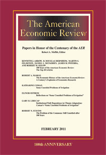
AMERICAN ECONOMIC REVIEW
Elevating Economic Discourse, One Article at a Time.AMERICAN ECONOMIC REVIEW, published by the American Economic Association, stands as one of the most prestigious academic journals in the field of Economics and Econometrics. With an impressive impact factor and ranking of #9 out of 716 in its category, this journal has achieved a notable position within the top 2% of journals globally, as evidenced by its Q1 classification in 2023. Covering a broad spectrum of economic theory and applied research, it serves as a primary platform for the dissemination of high-quality scholarly work, contributing significantly to the ongoing dialogue within the discipline. Although Open Access options are not available, the journal's rigorous peer-review process ensures that published articles uphold the highest standards of academic integrity and relevance. With coverage spanning from 1973 to 2024, the AMERICAN ECONOMIC REVIEW continues to be an essential resource for researchers, professionals, and students eager to stay at the forefront of economic thought and innovation.